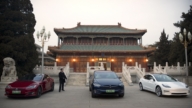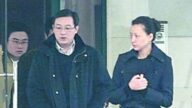【新唐人2013年03月19日訊】星期天中共「人大」會議閉幕。新科總理李克強舉行首次記者會,回答中外記者提問,外國媒體表示,當今中國由「知青一代領導」。有大陸學者警告,中共官員的話能否落實,取決於利益集團的博弈。
「英國廣播公司」《BBC》直接了當評價李克強﹕語言儉樸直白,同上屆總理溫家寶喜歡引用古文、古詩,形成鮮明對比。還表示,李克強在記者會上的「喊破嗓子不如甩開膀子」,「要人民過上好日子,政府就要過緊日子」,這類平民化的用語,更與國家主席習近平的風格相近,似乎預示了「習李」的執政風格將不同於「胡溫」。
1984年畢業於「北京大學」法律學系的原國務院辦公廳秘書俞梅蓀,向《新唐人》披露,李克強是他的校友,比他高一年級。
原國務院辦公廳秘書俞梅蓀:「八二年的時候,我在北大上法律的時候,他是研究生。他是法學碩士,後來又是經濟學博士。從這個知識結構角度來說,他具有經濟和法律知識的這麼一個總理。他的首次記者招待會,他也說到依法治國,也說到改革,他反覆強調依法治國,強調法治化,多次強調以憲法,多次強調要幹實事。」
俞梅蓀透露,李克強在大學裡曾經創造「法制系統工程」這個概念。
原國務院辦公廳秘書俞梅蓀:「學校的時候,他搞法制系統工程。大概是在81年、82年的時候,法制系統工程熱,他首先創造了要搞法制系統工程。當時我不懂,甚麼叫法制系統工程。感覺這是個好東西,但是這個是天書,不懂。後來有個同學告訴我,是李克強,介紹李克強的觀點。後來我同學拉著我一塊去找李克強談了。」
《BBC》報導說,中共中央政治局常委中,習近平、李克強、張德江和王岐山都有過「上山下鄉」的經歷。習近平曾經回憶,農村插隊給他最大的收穫是:讓他懂得了甚麼是實際,甚麼是實事求是,甚麼是群眾。
俞梅蓀表示,自己正是知青一代。他跟習近平同年出生,下鄉勞動八年。他認為,被剝奪受教育的機會帶來知識的欠缺,但是在底層跟農民一塊幹活,也有很大收穫,知道了中國的現實,知道了中國生活的來之不易。
原國務院辦公廳秘書俞梅蓀:「他在最艱苦的情況下,自強不息努力奮鬥。而且感受到當時毛澤東時代文革時代的這種計劃經濟,這種專制,人治的危害,我們這些人,習近平,李克強,所有這些常委們,這個年代的人,都在底層充分的感受到人治的危害,計劃經濟的危害,都是有切膚之痛的。」
俞梅蓀表示,這些經歷對於習、李的執政方針當然會有影響,深受過去人治以及政治「左的危害」,他們必然本能的要改革。
湖北省作家阮雲華表示,他對新領導人的任何話語都不是很感興趣。因為任何一屆新領導人在說話的時候,都說的很好。但關鍵是,講話和付出的行動能不能保持一致。
湖北省作家阮雲華:「你作為新一代領導人,你對這個社會到底能夠起到甚麼樣的作用,不是他說了算的。是各集團利益博弈的結果。如果他想改革,但是利益集團的人,他認為你觸犯了他的利益,他就會 跟你對著幹。那麼他們之間就需要一個妥協。」
阮雲華表示,中共領導人如果公布官員財產,老百姓就認為他們真的是在改革。如果做不到,說那些話都沒用。老百姓要看的是實際的東西。
阮雲華是「官員財產公示簽名徵集中國行」發起人,今年一月以來,他和其他人辛勤奔走大江南北12座城池徵集簽名。在北京,他們遭到全程監控,向人大代表提交建議的努力被攔阻。
採訪編輯秦雪 後製陳建銘
China’s Rusticated Youth Leaders Have No Final Say
On March 17th the National People’s Congress of the
Chinese Communist Party (CCP) was closed.
Li Keqiang, CCP regime’s new premier,
held his first news conference.
Foreign media commented that today’s China is under
the leadership of “the generation of rusticated youth”.
China’s scholars, however, believe that whether CCP leaders
can fulfill their promises, the final say comes from the result
of the games played among the interests groups.
BBC described that Li Keqiang spoke straightforwardly.
The article said that Li is in sharp contrast to his predecessor,
Wen Jiabao, who liked to quote ancient poetries.
Li’s folksy wording is very similar to Xi Jinping’s speaking style.
This seems to indicate that Xi-Li administration is
different from that of Hu-Wen, said the commentary.
Yu Meisun, former secretary of the General Office at the State
Department, was Li Keqiang’s alumni at Peking University.
Yu Meisun: “In 1982 when I was a law student
at Peking University, he was a graduate student.
He got a Masters in Law, and then a Ph.D. in economics. So he
is a premier with specialized knowledge in economics and law.
On his first press conference,
he spoke of rule of law and reform.
He has repeatedly emphasized the rule of law,
governance based on the constitution and doing solid work.”
Yu Meisun says that at university, Li Keqiang developed
a concept of “systematic engineering of law”.
Yu Meisun: “At university, he engaged in
the systematic engineering of law.
It was around in 1981 when there was a fever of learning
systematic engineering of law, and he was an explorer.
I didn’t understand the term at the time,
but believed it was a good thing.
A classmate introduced me to Li Keqiang,
and told me about Li’s views.
Later my classmate took me to talk with Li Keqiang.”
BBC reported that among members of the
CCP Politburo Standing Committee,
Xi Jinping, Li Keqiang, Zhang Dejiang and Wang Qishan
all experienced “Down to the Countryside”,
A movement launched by the CCP regime. It quoted
Xi Jinping’s recall that the rusticated youth life taught him:
What actuality is, what practicality is, and who the masses are.
Yu Meisun was also a rusticated youth. The same age as
Xi Jinping, he spent eight years at a farming village.
Yu acknowledges that in those days, the deprivation of
education cut off access to the knowledge.
Yet by working with the farmers, he still gained a lot,
he says, such as the actuality and hard-won life in China.
Yu Meisun: “Under the most arduous circumstances,
the rusticated youth insisted on striving.
In those days under Mao’s rule, they could understand
the harm from the planned economy and rule by dictator.
So people of our generation, including Xi Jinping, Li Keqiang
and other Standing Committee members.
They have all suffered from the dictatorial rule and the
planned economy.”
Yu Meisun remarks that these experiences will surely
have an impact on Xi-Li’s governing policies.
Whipsawed by the left-wing political rule, inevitably,
they will promote reforms, according to Yu.
Ruan Yunhua, writer in Hunan province, says that
he is never interested in any CCP leader’s talk.
This is because the new leaders always speak very nicely.
The problem is that their actions have never fulfilled
their promises.
Ruan Yunhua: “As a new state leader,
what role can he play in this society?
It is not decided by him, but by a result of
the games played among interests groups.
If he wants to carry out reforms, the interests groups
think that it will affect their interests and be antagonized.
Then they’ll have to arrive at a compromise.”
Ruan Yunhua comments that if the CCP leaders really
implement officials’ asset declaration,
that would convince the public that they’re really
carrying out reforms.
Otherwise, all the talk issueless, as civilians only
value what has done in reality, he says.
Ruan Yunhua is a sponsor who launched a signature collection
campaign to promote officials’ asset declaration in China.
Since this January, he and other participants have been
to 12 cities to collect signatures.
In Beijing, under police surveillance, they were blocked from
submitting a petition to the National People’s Congress.



























